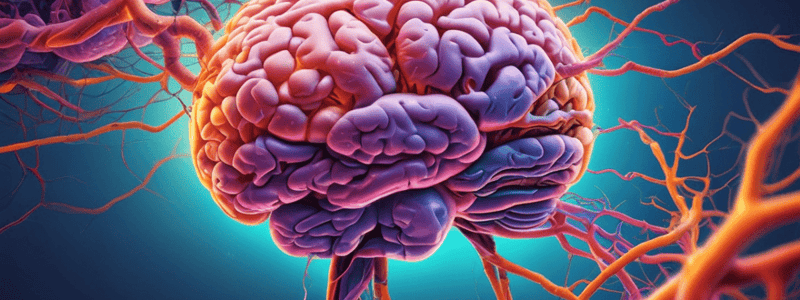Podcast
Questions and Answers
What is the primary role of neurotransmitters at the synapse?
What is the primary role of neurotransmitters at the synapse?
- To insulate the axon terminals
- To provide energy to the neurons
- To cross the synaptic cleft and bind to receptors on the postsynaptic membrane (correct)
- To form new neural pathways
Which brain region is critical for the consolidation of declarative memories?
Which brain region is critical for the consolidation of declarative memories?
- Brainstem
- Prefrontal cortex
- Cerebellum
- Hippocampus (correct)
What is the main function of the cerebellum?
What is the main function of the cerebellum?
- Storing long-term memories
- Regulating balance and posture (correct)
- Controlling higher cognitive functions
- Processing sensory information
Which of the following is not a characteristic of neurons?
Which of the following is not a characteristic of neurons?
Which neurological disorder is characterized by recurrent seizures?
Which neurological disorder is characterized by recurrent seizures?
What is the main component of the synapse?
What is the main component of the synapse?
What is the function of Acetylcholine as a neurotransmitter?
What is the function of Acetylcholine as a neurotransmitter?
Which neurotransmitter is known for its role in reward, motivation, and movement?
Which neurotransmitter is known for its role in reward, motivation, and movement?
What is the function of Norepinephrine(NE) as a neurotransmitter?
What is the function of Norepinephrine(NE) as a neurotransmitter?
Which neurotransmitter is an inhibitory neurotransmitter that calms nerve cells and reduces brain activity?
Which neurotransmitter is an inhibitory neurotransmitter that calms nerve cells and reduces brain activity?
What is a common symptom of Alzheimer's Disease?
What is a common symptom of Alzheimer's Disease?
Which neurological disorder is characterized by tremors, stiffness, and slow movements?
Which neurological disorder is characterized by tremors, stiffness, and slow movements?
Study Notes
Neurology is a branch of medicine dealing with disorders of the nervous system. It encompasses various aspects of brain function, including neurotransmission, structure, and disease processes. In this article, we will explore key terms in neurology, specifically those related to neurotransmitters, neurological disorders, synapses, brain regions, and neurons.
Neurotransmitters
Neurotransmitters are chemical substances in the nervous system that facilitate communication between neurons. They transmit signals across a synapse or junction between two neurons or between a neuron and an effector cell. Some common neurotransmitters include:
- Acetylcholine: A neurotransmitter involved in learning, memory, and muscle contraction.
- Dopamine: Known for its role in reward, motivation, and movement.
- Serotonin: A neurotransmitter associated with mood regulation.
- Norepinephrine(NE): Also known as noradrenaline, it helps regulate sleep, alertness, and response to stressors.
- Gamma-Aminobutyric Acid (GABA): An inhibitory neurotransmitter that calms nerve cells and reduces brain activity.
Neurological Disorders
Neurological disorders affect various aspects of the nervous system. Some common neurological disorders include:
- Alzheimer's Disease: A progressive neurological disorder that primarily affects older adults, causing memory loss and cognitive decline.
- Parkinson's Disease: A movement disorder characterized by tremors, stiffness, and slow movements.
- Multiple Sclerosis (MS): An autoimmune disease that damages the protective covering of nerve fibers, leading to communication problems between the brain and other parts of the body.
- Epilepsy: A chronic neurological condition marked by recurrent seizures.
Synapses
Synapses are specialized junctions where neurons communicate with each other or with muscles and glands. They are composed of two main regions: the axon terminal of one cell and the dendritic spine of another cell. Neurotransmitters released from the axon terminal cross the synaptic cleft, a small gap between the cells, to bind with receptors on the postsynaptic membrane. The binding of neurotransmitters to their respective receptors can either excite or inhibit the post-synaptic neuron.
Brain Regions
The human brain consists of different regions, including the cerebrum, cerebellum, brainstem, and spinal cord. Each region plays specific roles in various functions such as thinking, sensation, motor control, balance, and more. Some notable brain regions include:
- Prefrontal Cortex: Involved in higher cognitive functions such as planning complex behavior, personality expression, decision making, and moderating social behavior.
- Hippocampus: Critical for the consolidation of declarative memories, which are formed when events are encoded into long-term memory.
- Cerebellum: Plays an important role in coordinating movements, maintaining posture, and regulating balance.
Neurons
Neurons are specialized cells that transmit information throughout the nervous system through synapses. They have three main parts: the cell body or soma, axon, and dendrites. The neuron's role is to receive messages from other neurons via dendrites, process them in the cell body, and then send out messages through the axon. By communicating with one another using neurotransmitters, neurons form networks that convey signals between different parts of the body.
Understanding these neurological terms can help provide context for diagnosing, treating, and managing various neurological disorders. It's essential to continue exploring the complexities of the nervous system to advance our knowledge of neurological conditions and develop effective treatments.
Studying That Suits You
Use AI to generate personalized quizzes and flashcards to suit your learning preferences.
Description
Test your knowledge of key terms and concepts in neurology, including neurotransmitters, neurological disorders, synapses, brain regions, and neurons. Explore the fundamental aspects of the nervous system and its functions related to communication, structure, and disease processes.




